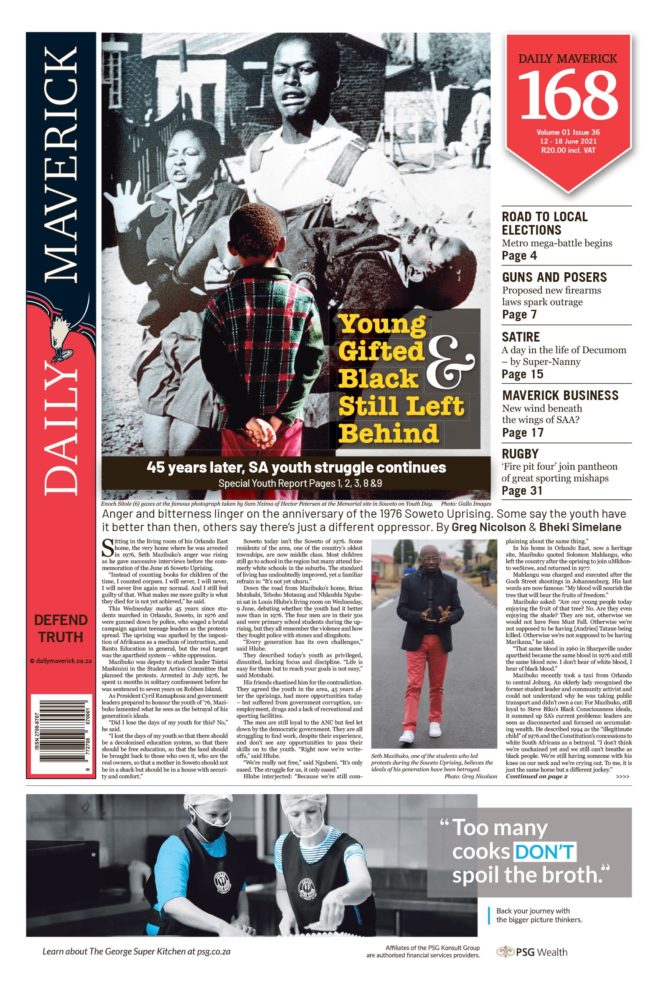First published in the Daily Maverick 168 weekly newspaper.
Some say press conferences are old-fashioned in the digital age. In South Africa, meanwhile, the question of President Cyril Ramaphosa, Cupcake or McBuffalo as he is known in social and mainstream media, is rather coy with his “family meetings”. He doesn’t provide the traditional question-and-answers session with the media. Press conferences are more engaging than reading a press release from an iPad, which makes both him and us sleepy.
Why do press conferences and, more saliently, the questions afterwards, matter? Some argue that new technology has made them anachronistic. But what is the alternative? Twitter? Here, a “handful” of about eight million out of a population of 58 million air their opinions and fights. It’s not a medium to inform the public about, for example, the latest on the pandemic, or provide excuses for why the vaccine roll-out is slow.
But, because the president is afraid to be asked these questions, he evades question time. Instead, he reads from carefully prepared but soporific speeches on his iPad, and then leaves. Journalists don’t get a chance to ask the valid questions, which continue to confound us all. For example, should people be waiting for their SMSes or may they join the queue for their vaccine? The answers change from week to week and from day to day.
Many journalists complain that, at press conferences, all they receive is a stock standard press release. But the minute there is an ANC presser in Luthuli House, they are all there, where they do get a chance to ask questions – that’s where the excitement is and where journalists find ideas for different angles to their stories, and plan other interviews to build into those stories.
There are several reasons press conferences still have relevance today.
First, besides print types, the television cameras and radio are there; these are key forms of media access for the majority in SA. Second, with TV, as in the unmediated televised Zondo Commission, access to what was said and seen is in real time: Malusi Gigaba questioned about his suits and cash in car boots; Brian Molefe, with his eyes shifting from left to right, and his hankie and tears, talking about the Saxonwold shebeen. Third, all these things affect our day-to-day lives. Four, reporters can ask questions, on the public’s behalf, and can make inferences from the questions that were evaded or answered badly, giving them leads to follow elsewhere.
When Ramaphosa gave his first one-on-one interview (that I noticed) last week, he struggled to appear casual and to inject some humour and energy. He was partially successful. But he also talked a lot and didn’t give much time to the interviewer to ask the tough questions.
Is this the start of something new and better than the one-way street of the “family meetings”, at which we are driven to listen (because pandemic news and restrictions affect our lives) but we have more questions than answers thereafter? Journalists would ask those questions if they were given the chance – as is usually the case at pressers, worldwide.
British Prime Minister Boris Johnson rambles on with feigned sincerity but often has his medical advisors next to him so the public can hear the answers after the journalists ask questions. Alas, the medical advisers are soporific. By contrast, South Africans say they found scientist Prof Salim Abdool Karim’s PowerPoints fascinating and accessible.
Former US president Donald Trump’s press conferences were an embarrassment. The current president, Joe Biden, has a sharp press secretary who ably runs the conferences at which many questions get asked. We can do better than these Global North examples.
In question-and-answer sessions, journalists will ask the obvious questions. That’s why Ramaphosa avoids such a format. Journalists would ask: Why is the roll-out so slow, what’s the story with the SMSes wait, for one? Don’t wait for one, or join a queue, wherever – those in the know say go to Chris Hani Baragwanath hospital? Why is the Johnson & Johnson jab still in Gqeberha, Eastern Cape? We can manufacture vaccines in SA, even if the company is a multinational one. Why, if the international regulators say we can’t use them, do we not do so? Because the Sisonke trial is not completed? Because a few clots were discovered in the US? False speculation may arise because journalists don’t get a chance to ask questions at the “family meetings”. Next question? When are you going to bring along your health minister, Zweli Mkhize – who started off so well at the start of the pandemic – to a press conference to answer questions about his Digital Vibes friends’ comms company saga?
Press conferences are useful, but of course their value increases if the question sessions take place. Ironically, press conferences have become more valuable now – in the era of a pandemic, misinformation, speculation and corruption – than ever before.
This wouldn’t be kicking a person when they are down; after all, it’s we who are down. DM168
This story first appeared in our weekly Daily Maverick 168 newspaper which is available for free to Pick n Pay Smart Shoppers at these Pick n Pay stores.


















 Become an Insider
Become an Insider
I mute sports journalists and their mostly unproductive and boring questions. The responses mostly don’t matter anyway. I have every sympathy with Osaka. But in other fields, carry on with the good work
In the Osaka case, most people who lambasted the value of press conferences, were talking specifically about those that followed tennis matches. Some, more broadly, certainly questioned their value in most sports. Very few comments that I read included the far wider scope of politics and other spheres of life, which this article seems to focus on. There is a distinction.